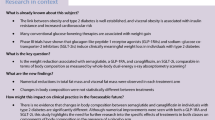Abstract
Breast cancer is the most common malignancy among women worldwide. There is extensive literature on the relationship between body weight and breast cancer risk but some doubts still remain about the role of adipokines per se, the role of insulin and glucose regardless of obesity, as well as the crosstalk between these players. Thus, in this study, we intend to determine the relation between body mass index (BMI), glycaemia, insulinemia, insulin-resistance, blood adipokine levels and tumour characteristics in a Portuguese group of pre- and postmenopausal overweight/obese women with breast cancer. We evaluated clinical and biochemical data in 154 participants, divided in 4 groups: (1) control with BMI <25 kg/m2, n = 29 (CT); (2) control with BMI >25 kg/m2, n = 48 (CTOb); (3) breast cancer with BMI <25 kg/m2, n = 30 (BC); and (4) breast cancer with BMI >25 kg/m2, n = 47 (BCOb). In women with breast cancer, we also performed tumour characterization. We found that BCOb present increased fasting blood glucose, insulin, resistin and monocyte chemoattractant protein 1, insulin resistance and more aggressive tumours. Notably, this profile is not correlated with BMI, proposing the involvement of other processes than adiposity. Altogether, our results suggest that glucose dysmetabolism, insulin resistance and changes in adipokine secretion, in particular resistin, may be involved in the development and progression of breast cancer in overweight/obese pre- and postmenopausal women.


Similar content being viewed by others
References
V.G. Vogel, Epidemiology, genetics, and risk evaluation of postmenopausal women at risk of breast cancer. Menopause 15, 782–789 (2008)
A.G. Renehan, M. Tyson, M. Egger, R.F. Heller, M. Zwahlen, Body-mass index and incidence of cancer: a systematic review and meta-analysis of prospective observational studies. Lancet 371, 569–578 (2008)
M. Dalamaga, Obesity, insulin resitance, adipocytokines and breast cancer: New biomarkers and attractive therapeutic targets. World J. Exp. Med. 20, 34–42 (2013)
D.H. Cohen, D. LeRoith, Obesity, type 2 diabetes, and cancer: the insulin and IGF connection. Endocr. Relat. Cancer 19, F27–F45 (2012)
P. Matafome, D. Santos-Silva, C.M. Sena, R. Seiça, Common mechanisms of dysfunctional adipose tissue and obesity-related cancers. Diabetes Metab. Res. Rev. 29, 285–295 (2013)
A.M. Lorincz, S. Sukumar, Molecular links between obesity and breast cancer. Endocr. Relat. Cancer 13, 279–292 (2006)
G.L. Anderson, M.L. Neuhouse, Obesity and the risk for premenopausal and postmenopausal breast cancer. Cancer Prev. Res. 5, 515–521 (2012)
L. Vona-Davis, D.P. Rose, Type 2 diabetes and obesity metabolic interactions: common factors for breast cancer risk and novel approaches to prevention and therapy. Curr. Diab. Rev. 8, 116–130 (2012)
D.P. Rose, L. Vona-Davis, The cellular and molecular mechanisms by which insulin influences breast cancer risk and progression. Endocr. Relat. Cancer 19, R225–R241 (2012)
A.T. Timóteo, F. Miranda, M.M. Carmo, R.C. Ferreira, Optimal cut-off value for homeostasis model assessment (HOMA) index of insulin- resistance in a population of patients admitted electively in a portuguese cardiology ward. Acta Med. Port. 27, 473–479 (2014)
American Diabetes Association, Classification and diagnosis of diabetes. Diabetes Care 38, S8–S16 (2015)
F. Xue, K.B. Michels, Diabetes, metabolic syndrome, and breast cancer: a review of the current evidence. Am. J. Clin. Nutr. 86, s823–s835 (2007)
Y. Huang, X. Cai, M. Qiu, P. Chen, H. Tang, Y. Hu, Y. Huang, Prediabetes and the risk of cancer: a meta-analysis. Diabetologia 57, 2261–2269 (2014)
N.S. Brown, R. Bicknell, Hypoxia and oxidative stress in breast cancer. Oxidative stress: its effects on the growth, metastatic potential and response to therapy of breast cancer. Breast Cancer Res. 3(5), 323–327 (2001)
H.S. Moon, M. Dalamaga, S.Y. Kim, S.A. Polyzos, O.P. Hamnvik, F. Magkos, J. Paruthi, C.S. Mantzoros, Leptin’s role in lipodystrophic and nonlipodystrophic insulin-resistant and diabetic individuals. Endocr. Rev. 34, 377–412 (2013)
R.S. Ahima, Adipose tissue as an endocrine organ. Obesity 14(5), 242S–249S (2006)
N.S. Brown, R. Bicknell, Hypoxia and oxidative stress in breast cancer: Oxidative stress: its effects on the growth, metastatic potential and response to therapy of breast cancer. Breast Cancer Res. 3, 323–327 (2001)
C.A. Sun, M.H. Wu, C.H. Chu, Y.C. Chou, G.C. Hsu, T. Yang, YuCP Chou Wy, J.C. Yu, Adipocytokine resistin and breast cancer. Breast Cancer Res. Treat. 123, 869–876 (2010)
M. Dalamaga, Resistin as a biomarker linking obesity and inflammation to cancer: potential clinical perspectives. Biomark. Med. 8(1), 107–118 (2014)
Y.C. Lee, Y.J. Chen, C.W. Chun, S. Lo, M.F. Hou, S.S. Yuan, Resistin expression in breast cancer tissue as a marker of prognosis and hormone therapy stratification. Gynecol. Oncol. 125, 742–750 (2012)
M. Dalamaga, K. Karmaniolas, E. Papadavid, N. Pelekanos, G. Sotiropoulos, A. Lekka, Hyperresistinemia is associated with postmenopausal breast cancer. Menopause 20, 845–851 (2013)
M. Dalamaga, G. Sotiropoulos, K. Karmaniolas, N. Pelekanos, E. Papadavid, A. Lekka, Serum resistin: a biomarker of breast cancer in postmenopausal women? Association with clinicopathological characteristics, tumor markers, inflammatory and metabolic parameters. Clin. Biochem. 46, 584–590 (2013)
Author information
Authors and Affiliations
Corresponding author
Ethics declarations
Conflicts of interest
There are no potential conflicts of interest.
Funding
This work was funded with a Grant (PTDC/SAU-MET/121133/2010) from the Portuguese Foundation of Science and Technology.
Rights and permissions
About this article
Cite this article
Crisóstomo, J., Matafome, P., Santos-Silva, D. et al. Hyperresistinemia and metabolic dysregulation: a risky crosstalk in obese breast cancer. Endocrine 53, 433–442 (2016). https://doi.org/10.1007/s12020-016-0893-x
Received:
Accepted:
Published:
Issue Date:
DOI: https://doi.org/10.1007/s12020-016-0893-x




